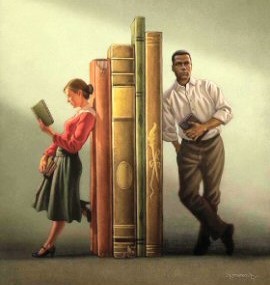For playwright Kenneth Jones, who was in the house for opening night of “Alabama Story” at Clarence Brown Theatre on the UT campus Friday night, the idea for his play began simply by reading a May 2000 story in the New York Times about a former Alabama state librarian, Emily Wheelock Reed, standing up to a segregationist state senator in Montgomery in 1959.
Sen. E. O. Eddins demanded that a children’s picture book, Garth Williams’ “The Rabbits’ Wedding,” be removed from the shelves of libraries across the state for promoting mixing among the races. The subject of the book was a black rabbit marrying a white rabbit, its race implications coming about simply because Williams wanted contrasting subjects for his book, printed in black and white.
With a cast of only six, including the gifted acting chameleon David Brian Alley, who plays Williams, and a handful of other characters, “Alabama Story” tells this seemingly simple but age-old conflict between books and censorship, set in the context of the developing civil rights movement.
As librarian Reed, Katie Cunningham gives a strong performance that is uncompromising in her professional and moral compass, venturing off her path of fair-play only once in her reaction to her steadfast assistant, Thomas Franklin, well-played by Chris Klopatek.
As the narrow-minded senator, whose name was changed in the play to Sen. E.W. Higgins, Brian Mani is staunch and focused.
Adding both a dimensioned side story and a human illustration of the issues at hand, are Jade Arnold (playing Joshua Moore) and Brittany Marie Pirozzoli (Lily Whitfield). Joshua, as a boy of 12 living with his mother, a house servant, on the cotton plantation of the Whitfield family, has a budding romance with young Lily.
In the play, they encounter each other as adults in a public park. Lily is there attending her father who is in a near-by hospital. Joshua comes from Detroit every year to work in the civil rights efforts taking shape at a local church.
The stage, in a kind of physical sleight-of-hand that has an almost invisible moving platform, transforms from the librarian’s office to the public park by moving props off to stage left or stage right.
It’s a brilliant staging device that seems to simplify complex social issues into their most basic human components through natural movement. People love each other. Change happens, with or without resistance.
In the age of Roy Moore, Alabama has become a metaphor for resistance to change. But, as the play illustrates, resistance isn’t the constant.
Change is.
“Alabama Story” runs through Feb. 18 with performances at 7:30 p.m. and weekend matinees at 2. Talk Back with the actors will follow the Sunday, Feb. 11, matinee. The open captioned performance will be Sunday, Feb. 18, at 2 p.m.
On Sunday, Feb. 4, a free panel discussion on the issue of censorship will take place at 2 p.m. at Lawson McGhee Library. On Tuesday, Feb. 6, a reception with playwright Kenneth Jones will take place on the CBT Mainstage from 6:30-7:30 p.m. followed by a free, staged reading of select censored children’s books.
For tickets, call the CBT box office at 865-974-5161.

